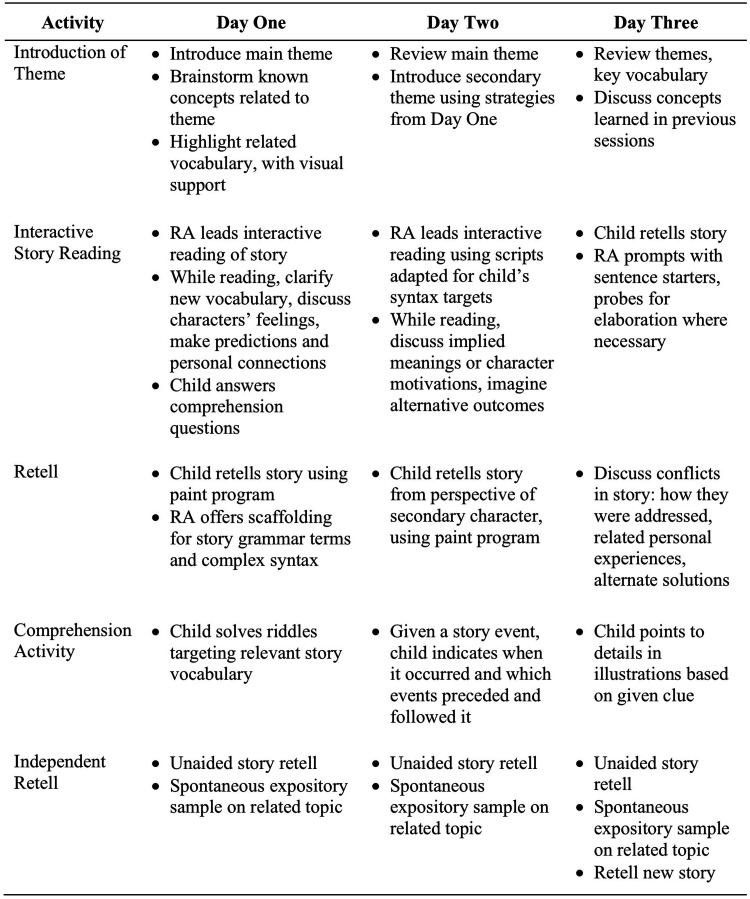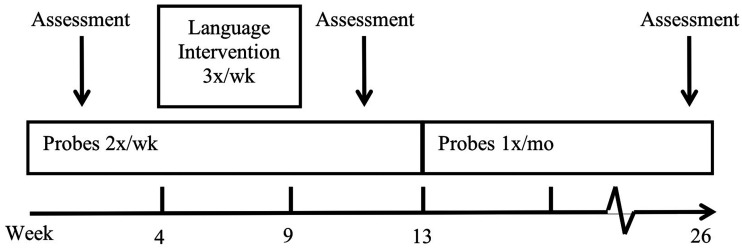Cognitive and linguistic effects of narrative-based language intervention in children with Developmental Language Disorder.
IF 3.4
Q1 EDUCATION, SPECIAL
Autism and Developmental Language Impairments
Pub Date : 2021-05-17
eCollection Date: 2021-01-01
DOI:10.1177/23969415211015867
引用次数: 7
Abstract
Background and aims Narrative-based language intervention provides a naturalistic context for targeting overall story structure and specific syntactic goals in children with Developmental Language Disorder (DLD). Given the cognitive demands of narratives, narrative-based language intervention also has the potential to positively impact related abilities such as working memory and academic skills. Methods Ten children (8–11 years old) with DLD completed 15 sessions of narrative-based language intervention. Results Results of single subject data revealed gains in language for five participants, four of whom improved on a probe tapping working memory. An additional four participants improved on a working memory probe only. On standardized measures, clinically significant gains were noted for one additional participant on a language measure and one additional participant on a visuospatial working memory. Carry over to reading was noted for three participants and to math for one participant. Across measures, gains in both verbal and visuospatial working memory were common. A responder analysis revealed that improvement in language may be associated with higher verbal short-term memory and receptive language at baseline. Those with working memory impairments were among those showing the fewest improvements across measures. Conclusions Narrative-based language intervention impacted verbal skills in different ways across individual children with DLD. Implications: Further research is needed to gain an understanding of who benefits most from narrative-based language intervention.



基于叙事的语言干预对发展性语言障碍儿童的认知和语言影响。
背景与目的:基于叙事的语言干预为发展性语言障碍儿童的整体故事结构和特定句法目标提供了一个自然的语境。考虑到叙事的认知需求,基于叙事的语言干预也有可能对工作记忆和学术技能等相关能力产生积极影响。方法:10名8-11岁的DLD患儿完成了15次基于叙述的语言干预。结果:单个受试者数据的结果显示,五名参与者在语言方面有所提高,其中四人在探索工作记忆方面有所提高。另外四名参与者仅在工作记忆探测上有所改善。在标准化测试中,一名额外的参与者在语言测试和一名额外的参与者在视觉空间工作记忆上获得了临床显著的收益。3名参与者注意到阅读的延续,1名参与者注意到数学的延续。在各种测量中,语言和视觉空间工作记忆的增加是普遍的。一项应答者分析显示,语言能力的提高可能与更高的短期言语记忆和接受性语言有关。那些有工作记忆障碍的人在各项测量中表现出的改善最少。结论:基于叙述的语言干预以不同的方式影响DLD儿童的语言技能。启示:需要进一步的研究来了解谁从基于叙述的语言干预中获益最多。
本文章由计算机程序翻译,如有差异,请以英文原文为准。
求助全文
约1分钟内获得全文
求助全文
来源期刊

Autism and Developmental Language Impairments
Psychology-Clinical Psychology
CiteScore
3.20
自引率
0.00%
发文量
20
审稿时长
12 weeks
 求助内容:
求助内容: 应助结果提醒方式:
应助结果提醒方式:


